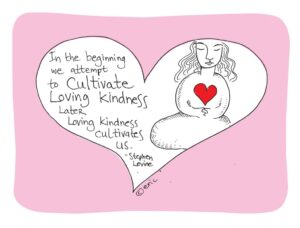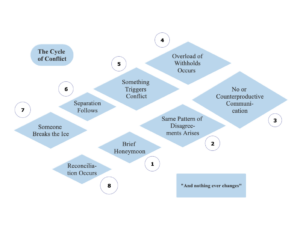
Credit: Stephen Levine and (c) Eric
Again the mysteries of the assassination attempt unfold. The Secret Service ignoring warnings of the shooter’s presence, them ordering the white-hat sniper not to shoot the deep-state shooter, trajectories, timing, etc. Questions arise on every side.
While all this is going on, here I am exploring the path of loving kindness.
I’ve followed the path of orneriness most of my life. On this new path, I’m challenged again and again and again. And it’s meeting those challenges that I’d like to talk about.
I’m challenged on two fronts: The first is by what I’ve called vasanas, after Ramana Maharshi, (1) which Linda Dillon calls “core issues,” equivalent in meaning.
These comprise the mental/emotional complex of memories and energies that gets triggered whenever we feel we’re getting into the same threatening situation again.
They’re what are triggered when we blow our tops, go nuclear, go insane with anger, etc.
One of the important effects of raising awareness of our vasanas is to get that what we’re angry about and who we’re angry at has little to do with the person in front of us and more to do with our parents or siblings, teachers or other influential figures, when we were young.
We can process or invoke the universal laws for divine aid in removing our vasanas. (2) It used to take years; I now believe it can be done much quicker.
The second challenge on the path of loving-kindness is the automatic behavior patterns that I fall into as a result of the conclusions and decisions I reached, which then became the foundation of the vasana.
If we didn’t reach a conclusion (no one loves me, I don’t rate, you can’t trust anyone), I wouldn’t reach a decision (I won’t love anyone, I don’t need people, I won’t trust anyone). There’d be no problem. Go on to the next article.
If I didn’t reach a decision, there in all likelihood would not be a lingering vasana.
I won’t love anyone becomes coldness and rigidity. I don’t need anyone becomes automatic depression. I don’t trust anyone becomes automatic suspiciousness. And we go from mood to mood depending on what has gotten triggered … now.
Just to remind us where all this is going: It’s going round and round and round, as the graphic illustrates:

The simple answer to the rampage we go on and to the vasana itself is to simply stop. Listen to the vasana but don’t act on it.
Don’t participate in your upset; observe it. Let go of any thought that prompts you to leave the observer position and become the participant.
Anything that feels resentful, hateful, angry can be assumed to come from the vasana. Any automatic pattern can be assumed to come from this or another vasana. Just let it go as you would a piece of luggage.
Anything that feels loving, kind, compassionate can be assumed to have come from your heart. Enjoy it. Nurture it. Fan its embers.
As Stephen Levine says, at first we cultivate it; later it cultivates us.
That’s my agenda for the next while: Just observe the barriers to loving-kindness as they arise and nurture the incipient divine states/feelings. (3) The white hats have things in hand, even an assassination attempt, apparently. My worry is strictly optional.
However, I can contribute, at this time, by raising my own vibration, with the aim of taking the whole world out of the reach of darkness and evil.
At the same time, I honor the courage and sacrifice of those who go into harm’s way to rescue our oppressed and exploited. Nothing I do should be interpreted as wanting to take the attention and resources away from them.
Footnotes
(1) See “Vasanas (Latent Tendencies)” at https://goldengaiadb.com/index.php?title=V#Vasanas_.28Latent_Tendencies.29 and following.
I follow Sri Ramana’s practise in using the term “vasana” because I’d like to link up western trauma teachings with eastern vasana teachings.
(2) On processing a vasana, see “How to Handle Unwanted Feelings: The Upset Clearing Process” in Vasanas: Preparing For Ascension by Clearing Old Issues at https://goldenageofgaia.com/wp-content/uploads/2024/05/Vasanas-Preparing-for-Ascension-R16.pdf
(3) A divine state may be experienced as a wisp of feeling that skoots across the desktop of our mind. But the fundamental experiential difference between a feeling and a divine state is that the former is experienced as happening within our field of awareness whereas the latter is experienced as something we’re immersed in. Our hearts hurt, but we’re immersed in love, bliss, ecstasy, joy, etc.

